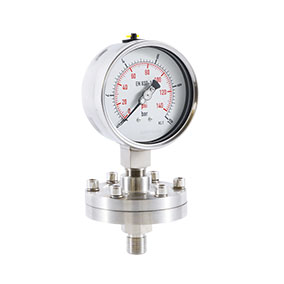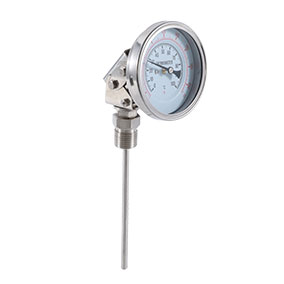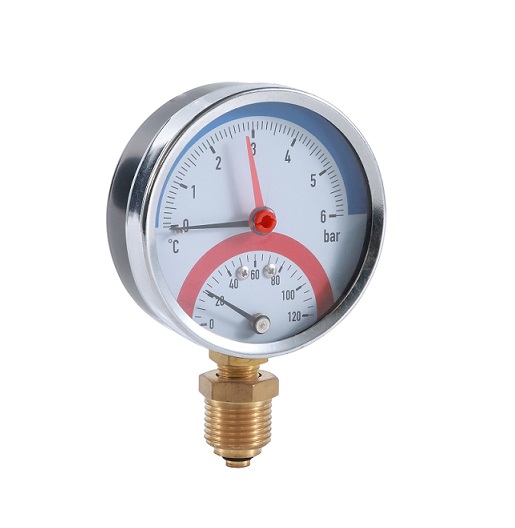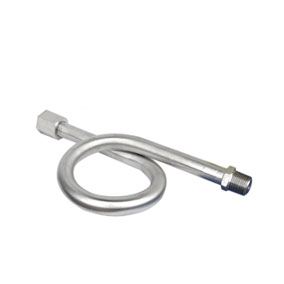How to Choose the Right Industrial Stainless Steel Pressure Gauge
In industrial production, pressure measurement is crucial for ensuring proper equipment operation and product quality. Stainless steel pressure gauges, particularly in complex and harsh environments, are the preferred choice in many industries due to their excellent corrosion resistance and high-temperature resistance. Choosing the right industrial manomètre en acier inoxydable not only improves measurement accuracy but also effectively extends the life of the equipment. This article will explain how to select the right industrial stainless steel pressure gauge based on your application needs, helping you make a sound and informed decision.
Definition and Main Applications of Stainless Steel Pressure Gauges
A stainless steel pressure gauge is a pressure measuring instrument made of stainless steel. It measures pressure changes in a fluid within a pipeline or device and converts the pressure value into a mechanical reading. Compared to traditional cast iron pressure gauges, stainless steel pressure gauges offer greater corrosion resistance and high temperature resistance, making them suitable for more demanding operating environments.
Major applications of stainless steel pressure gauges include:
Petrochemical Industry: Pressure control within equipment is crucial in oil and gas extraction and chemical production processes. Stainless steel pressure gauges can operate reliably in environments with high temperatures, high pressures, corrosive gases, and liquids.
Food Processing Industry: Pressure monitoring is crucial to ensuring product quality and safety during food production. Stainless steel pressure gauges are resistant to dirt and corrosion in this environment, ensuring long-term, unaffected operation.
Pharmaceutical Industry: Pharmaceutical equipment often requires precise pressure control during production. Stainless steel pressure gauges comply with GMP (Good Manufacturing Practice) requirements, ensuring precise control during production.
Water Treatment Industry: During water treatment, manomètres help monitor water flow pressure and ensure the smooth progress of the water purification process.
How to Choose the Right Stainless Steel Pressure Gauge for Industrial Use
When choosing the right stainless steel pressure gauge for industrial use, you should first consider the following key factors:
1. Determine the Pressure Range
The operating pressure of each industrial application varies, so when selecting a pressure gauge, you should first determine the gauge’s operating range. The operating range of a pressure gauge includes the minimum and maximum measurable pressure values. If the operating environment experiences significant pressure fluctuations, it is recommended to select a pressure gauge with a large margin. This will prevent damage caused by exceeding the gauge’s range.
2. Select the Appropriate Accuracy Grade
The accuracy of a pressure gauge is a crucial factor. The accuracy grade determines the gauge’s measurement error. Generally speaking, higher accuracy results in more accurate measurements. Industrial pressure gauges typically come in different accuracy grades, such as 1.0, 1.6, and 2.5. For applications requiring high precision, a pressure gauge with an accuracy of 1.0 or higher is recommended. When choosing a pressure gauge, consider the accuracy requirements of your application.
3. Confirm the material and corrosion resistance.
Stainless steel pressure gauge housings are typically made of two materials: 304 and 316. 304 stainless steel is suitable for general industrial environments, while 316 stainless steel is suitable for environments with strong chemical corrosion, such as acids and alkalis. When selecting a pressure gauge, consider the material appropriate for the corrosive nature of your operating environment. If your operating environment involves acidic or alkaline gases or liquids, a 316 stainless steel pressure gauge is recommended.
4. Consider the mounting method and connection size.
Stainless steel pressure gauges are typically mounted using either threaded or flanged connections. When selecting a pressure gauge, consider the appropriate connection type based on the equipment’s interface requirements. Common connection sizes include 1/4 inch, 1/2 inch, and 3/4 inch. Before installation, ensure the pressure gauge’s connection matches the equipment to prevent leaks or loose connections.
5. Response Speed and Operating Temperature
In applications where pressure fluctuates frequently, a pressure gauge with a faster response speed is required. For example, liquid-filled pressure gauges typically respond more quickly and can promptly reflect pressure fluctuations. Furthermore, different industrial environments have different operating temperature requirements for pressure gauges. Ensure that the pressure gauge you choose can withstand the operating temperature range to prevent performance degradation due to excessively high or low temperatures.
6. Protection Rating and Environmental Adaptability
In some industrial environments subject to dust and splashing liquids, it is crucial to choose a pressure gauge with a high protection rating. Protection ratings such as IP65 and IP67 effectively prevent foreign matter from entering the pressure gauge, protecting its internal structure. Furthermore, water and dust resistance can effectively extend the lifespan of the pressure gauge.
7. Brand and Price
Choosing a pressure gauge from a reputable brand can effectively guarantee quality and performance. However, price is also a factor to consider. If your budget is limited, you can choose a cost-effective pressure gauge, but you still need to ensure that its quality meets your production needs.
Selecting the right stainless steel pressure gauge for industrial use requires comprehensive consideration of several factors, including pressure range, accuracy, material, and mounting method. Only by fully understanding the actual working environment and measurement requirements can you ensure that you purchase the most appropriate pressure gauge and ensure the stability and safety of your production process. Hopefully, this article will provide you with a clearer understanding of how to select a high-quality, reliable industrial stainless steel pressure gauge, providing strong support for your company’s equipment management and production optimization.





